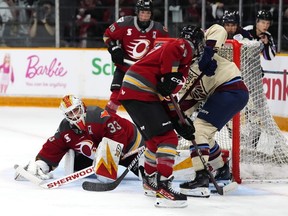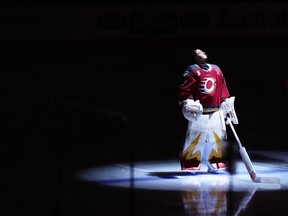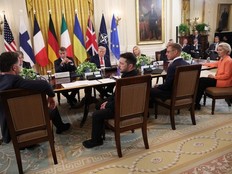Why Gwyneth Philips was built for this moment with the Ottawa Charge
The unflappable goaltender has bided time her entire career, but she’s proving that her moment has arrived.

Article content
The Ottawa Charge is a single victory away from a PWHL final date with the defending-champion Minnesota Frost, and reason No. 1 is Gwyneth Philips.
With a league-leading .957 save percentage and 1.18 goals-against average in the postseason, the first PWHL playoff shutout ever recorded by a rookie and a nomination for goaltender of the year, it feels like everyone has just been living in Philips’ world this past week — but for Philips, who knows all about biding her time, this moment has been a long time coming.
“Her label is a first-year goalie. She’s new to it all, but she’s not new to the game,” Charge head coach Carla MacLeod says. “She’s just enjoying the opportunity. That’s the key. Outside people might see it as a pressure. As the inside athlete, that’s just the moment you’ve been hoping for and dreaming of.”
Throughout her young career, Philips has grown accustomed to being afforded only small windows of opportunity to prove herself.
While most PWHL goalies reached the pro ranks after several seasons under their belt as a No. 1 netminder for their respective college teams, Philips spent much of her post-secondary career watching from the bench. For her first three seasons at Northeastern University, she was logjammed by fellow PWHL goaltender of the year finalist Aerin Frankel.
“I wasn’t a starter until my senior year, so I kind of got, not necessarily comfortable, but I have a good understanding of what it is to be that backup goalie and be ready and on my toes when I need to be called up,” Philips told TSN 1200 on Wednesday.

When her chance at Northeastern finally arrived in 2022-23, she seized it. That season, Philips posted an eye-popping .960 save percentage and 0.87 goals-against average, earning NCAA goaltender of the year honours.
After another sparkling season as Huskies starter, Philips was the first goaltender taken in the 2024 PWHL draft. That meant being inserted behind seven-time world championship and 2022 Olympic medalist Emerance Maschmeyer with the Ottawa Charge. It was familiar territory.
“I’m comfortable being there, knowing how to be supportive and also be on their heels a little bit,” Philips said in October.
Between backing up Frankel in college and Maschmeyer in Ottawa, few goalies have had a tougher road to receiving starts than Philips. But few goalies are as talented as Philips. With occasional starts in the early months of her first pro season to give Maschmeyer rest, the young netminder showed she could be a starter in her own right, if only the opportunity came along.
When Maschmeyer went down on March 11 with a lower-body injury, Philips seized the net, and she has yet to look back. While Maschmeyer was undoubtedly the team’s first-half season MVP, it was Philips who fueled a late-season turnaround to thrust the Charge to its first playoff berth.
She won five of eight consecutive starts to end the season, including six with two or fewer goals allowed. Overall, Philips recorded eight wins in 15 regular-season appearances, tied for second in the league with two shutouts and posted a 2.11 goals-against average that was third-best among starters and a .919 save percentage that tied for third.
“She stepped into a scenario that couldn’t have been predicted, but obviously she continues to rise in these moments,” MacLeod says.
Another one of those moments was in April during the women’s world championship in Czechia, where Philips relieved Team U.S.A. starter Frankel midway through the gold-medal game against Canada. The stage wasn’t too big for her, as she stopped 17 of 18 shots en route to a gold-medal victory in overtime.
“All those moments add up,” MacLeod says. “As an athlete, you want to have as many experiences as you can. You get opportunities to learn in those moments and to live them. And I think for Gwyn she’s just been able to step into every opportunity and just go about it the right way.”

An athlete bringing their best when the stakes are highest normally requires a level of mental fortitude that takes years and oodles of experience to attain, but Philips is unique. Her calm and unflappable demeanour is seemingly in equal proportion to her competitive fire.
“I think I do give a calming presence on the ice,” Philips says. “However, I don’t think that is my vibe off the ice.” She says she’s loud and witty away from the rink, but to her teammates her lighthearted and sometimes boisterous nature goes hand in hand with the calm and confidence she exudes.
“In the locker room, she’s the one cracking jokes, she’s the loud one, she’s so calm,” rookie forward Mannon McMahon says. “And I think that wears off on the rest of us.”
MacLeod suggests that Philips sits in a unique place on the “scale of arousal” relative to her teammates.
“Every athlete has their own personality, and, when you can be true to who you are and just actually be yourself, that tends to lend itself to be a successful way to go about things,” MacLeod said. “Everyone’s wired a little bit differently, and some need to be a little bit higher on that scale of arousal. She knows what she needs to be to be at her best.”
No matter the reason, Philips’ confidence is peaking alongside the team’s when it matters most. She’s always known how to bide her time. Now, she’s making the most of it.














Postmedia is committed to maintaining a lively but civil forum for discussion. Please keep comments relevant and respectful. Comments may take up to an hour to appear on the site. You will receive an email if there is a reply to your comment, an update to a thread you follow or if a user you follow comments. Visit our Community Guidelines for more information.